Why did banks become so overexposed in the run-up to the credit crunch? A risk manager at a large global bank–someone whose job it was to make sure that the firm did not take unnecessary risks — explains in his own words
IN JANUARY 2007 the world looked almost riskless. At the beginning of that year I gathered my team for an off-site meeting to identify our top five risks for the coming 12 months. We were paid to think about the downsides but it was hard to see where the problems would come from. Four years of falling credit spreads, low interest rates, virtually no defaults in our loan portfolio and historically low volatility levels: it was the most benign risk environment we had seen in 20 years.
As risk managers we were responsible for approving credit requests and transactions submitted to us by the bankers and traders in the front-line. We also monitored and reported the level of risk across the bank’s portfolio and set limits for overall credit and market-risk positions.
Big Box Retail 2008: Costco Arrives in (Madison) Middleton
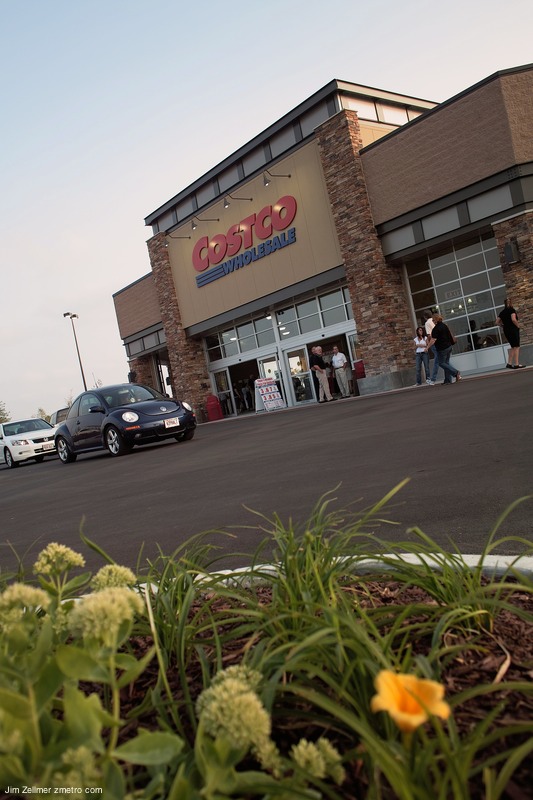
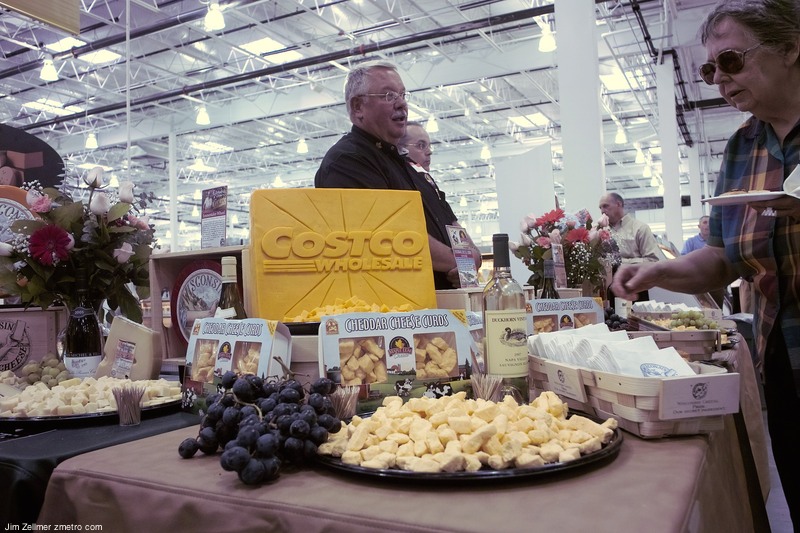
Costco held a very well attended party this evening celebrating the opening of their new Middleton warehouse club [Map].
I did not see a stand to purchase law degrees.
Middleton provided a TIF (Tax Incremental Financing) agreement to the site developer. A related Isthmus article can be found here.
A few additional photos:
 |
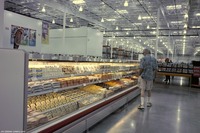 |
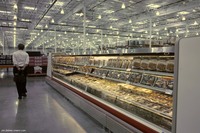 |
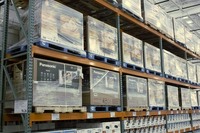 |
 |
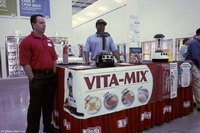 |
Clusty search: Costco.
Latest News Audience Survey
The 2008 biennial news consumption survey by the Pew Research Center for the People & the Press was conducted by telephone – including both landline phones and cell phones – from April 30 to June 1 among 3,612 adults nationwide. It finds four distinct segments in today’s news audience: Integrators, who comprise 23% of the public; the less populous Net-Newsers (13%); Traditionalists – the oldest (median age: 52) and largest news segment (46% of the public); and the Disengaged (14%) who stand out for their low levels of interest in the news and news consumption.
Net-Newsers are the youngest of the news user segments (median age: 35). They are affluent and even better educated than the News Integrators: More than eight-in-ten have at least attended college. Net-Newsers not only rely primarily on the internet for news, they are leading the way in using new web features and other technologies. Nearly twice as many regularly watch news clips on the internet as regularly watch nightly network news broadcasts (30% vs. 18%).
This web-oriented news segment, perhaps more than the others, underscores the challenges facing traditional news outlets. Fewer than half (47%) watch television news on a typical day. Twice as many read an online newspaper than a printed newspaper on a typical day (17% vs. 8%), while 10% read both.
However, Net-Newsers do rely on some well known traditional media outlets. They are at least as likely as Integrators and Traditionalists to read magazines such as The New Yorker and The Atlantic, and somewhat more likely to get news from the BBC.
Lessig on John McCain’s Technology “Platform”
I have my doubts – unfortunately – that Obama will be much better on the crucial broadband issue for two reasons:
- AT&T, very good at spreading the
lovemoney, or the king of telco lobbying is sponsoring the Democratic convention - Our own Democratic Governor – Jim Doyle, recently signed a AT&T supported “Video competition bill” into law – maybe useful for AT&T, but hardly good for citizens.
The Coming Boom in Medical Travel
HEALTH care has long seemed one of the most local of all industries. Yet beneath the bandages, globalisation is thriving. The outsourcing of record keeping and the reading of X-rays is already a multi-billion-dollar business. The recruitment of doctors and nurses from the developing world by rich countries is also common, if controversial. The next growth area for the industry is the flow of patients in the other direction–known as “medical tourism”–which is on the threshold of a dramatic boom.
Tens of millions of middle-class Americans are uninsured or underinsured and soaring health costs are pushing them and cost-conscious employers and insurers to look abroad for savings (see article). At the same time the best hospitals in Asia and Latin America now rival or surpass many hospitals in the rich world for safety and quality. On one estimate, Americans can save 85% by shopping around and the number who will travel for care is due to rocket from under 1m last year to 10m by 2012–by which time it will deprive American hospitals of some $160 billion of annual business.
Ancient Midwest

THE earthworks left behind by the long vanished civilizations of the Midwest are harder to spot than the pueblos and kivas of Arizona and New Mexico. For a long time many of them were hidden in plain sight or dismissed as little more than heaps of soil. But the more today’s archaeologists learn about the Midwestern mounds, the more intriguing is the picture that emerges from 1,000 or more years ago: a city with thousands of people just a few miles from present-day St. Louis, a 1,348-foot earthen serpent that points to the summer solstice, artifacts made of materials that could only have arrived over lengthy trade routes.
Looks like a fascinating drive.
The new age of authoritarianism
In 1989, the Berlin Wall fell, democracy was on the march and we declared the End of History. Nearly two decades later, a neo-imperialist Russia is at war with Georgia, Communist China is proudly hosting the Olympics, and we find that, instead, we have entered the Age of Authoritarianism.
It is worth recalling how different we thought the future would be in the immediate, happy aftermath of the end of the cold war. Remember Francis Fukuyama’s ringing assertion: “The triumph of the west, of the western idea, is evident first of all in the total exhaustion of viable systematic alternatives to western liberalism.”
Even in the heady days of 1989, that declaration of universal – and possibly eternal – ideological victory seemed a little hubristic to Professor Fukuyama’s many critics. Yet his essay made such an impact because it captured the scale, and the enormous benefits, of the change sweeping through the world. Not only was the stifling Soviet – which was really the Russian – suzerainty over central and eastern Europe and central Asia coming to an end but, even more importantly, the very idea of a one-party state, ruthlessly presiding over a centrally planned economy, seemed to be discredited, if not forever, then surely for our lifetimes.
Meet the New Boss, Same as the Old Boss
BRODY MULLINS and ELIZABETH WILLIAMSON:
When the Democratic Party holds its convention the week after next, members of Congress will be able to hear singer Kanye West at an all-expenses paid party sponsored by the recording industry.
They can play in a poker tournament with Ben Affleck, courtesy of the poker industry. They can try to hit a home run at Coors Field, home of the Colorado Rockies, thanks to AT&T Corp. Free drinks and cigars will be on offer at a bash thrown by the liquor industry.
The corporate largesse is on tap despite new ethics laws and rules that both chambers of Congress adopted in 2007, aimed at weakening the links between lawmakers and lobbyists. Spearheaded by the Democratic Party, the ethics effort included an attempt to ban corporations and lobbyists from throwing lavish parties for members at the national political conventions.
But in the months since the new rules took effect, lawmakers have watered down the guidelines, and Capitol Hill and K Street have teamed up to find ways around the guidelines as written. Politicians and lobbyists are now preparing about 400 of the biggest parties — both at the Democratic gathering in Colorado and when Republicans convene the following week in St. Paul — that conventioneers have ever seen.
California Declares Free Market Broken, Recommends Price Controls For Phone Services
Verizon, AT&T, and their regulated cohorts love to blab how the “free market” and “competition” will keep prices low for consumers. According to California, it’s a big fat expensive lie. The cost of basic phone service has soared since the Public Utilities Commission lifted price controls in 2006, leading the agency to conclude:
“There is no indication of any change in the near future regarding the current state of competition. Market forces have not yet met the challenge of controlling price increases.”
AT&T Mulls Watching You Surf
AT&T is “carefully considering” monitoring the Web-surfing activities of customers who use its Internet service, the company said in a letter in response to an inquiry from the House Committee on Energy and Commerce.
While the company said it hadn’t tested such a system for monitoring display advertising viewing habits or committed to a particular technology, it expressed much more interest in the approach than the other big Internet providers who also responded to the committee’s letter.
AT&T did however promise that if it does decide to start tracking its customers online, it will “do so the right way.” In particular, the advertising system will require customers to affirmatively agree to have their surfing monitored. This sort of “opt-in” approach is preferred by privacy experts to the “opt-out” method, practiced by most ad targeting companies today, which records the behavior of anyone who doesn’t explicitly ask to not to be tracked.